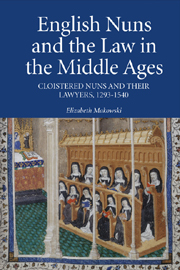6 - Episcopal Arbitration
from II - Select Cases
Published online by Cambridge University Press: 05 April 2013
Summary
Bishops, archbishops, and their officials were often called upon to settle disputes outside of their courtrooms. By agreeing to abide by the decision of a respected and experienced arbitrator disputants saved both time and money. Justices and serjeants at law strove to effect out-of-court settlements in matters governed by the common law and bishops and their officials did the same in the ecclesiastical forum. Like their secular counterparts, episcopal arbiters executed a final decree or concord in a case after considering the petitions and arguments of the disputants. Of course that decree did not always have the desired effect. Settlements were sometimes only temporary and parties to a dispute might find themselves in a courtroom after all, or at least before another arbiter. This was precisely what happened when a conflict arose between the Minoresses of the newly founded monastery of Waterbeach and the canons of Barnwell Priory.
Founded by Denise de Munchensey in 1293–1294, and completely subsumed into Mary St Pol's new foundation of Denney by 1351, the Abbey of Waterbeach had a short but turbulent history. The serious difficulties attending the merger of the two houses will be treated in the next chapter since the affair was resolved only by active intervention of the papacy via judges delegate. Although the dispute with Barnwell Priory would also involve such a papal petition it more aptly illustrates the role of the local bishop, or, in this case, bishops as arbiters.
- Type
- Chapter
- Information
- English Nuns and the Law in the Middle AgesCloistered Nuns and their Lawyers, 1293–1540, pp. 119 - 136Publisher: Boydell & BrewerPrint publication year: 2012



